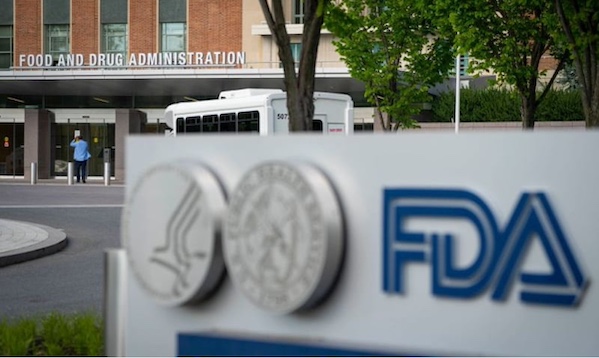FDA Roundup
December 26, 2023
Source: drugdu
 378
378

Today, the U.S. Food and Drug Administration is providing an at-a-glance summary of news from around the agency:
Today, the FDA issued a guidance for industry titled, “Rare Diseases: Considerations for the Development of Drugs and Biological Products" This guidance clarifies the FDA’s thinking on important considerations in rare disease drug development to ultimately assist rare disease drug and biologic product developers in conducting successful drug development programs. For more information and to submit a comment about this guidance, please visit Rare Diseases: Considerations for the Development of Drugs and Biological Products; Guidance for Industry; Request for Comments.
On Thursday, the FDA warned consumers not to use counterfeit Ozempic (semaglutide) found in U.S. drug supply chain. The FDA continues to investigate counterfeit Ozempic (semaglutide) injection 1 milligram (mg) in the legitimate U.S. drug supply chain and has seized thousands of units of the product. The agency advises wholesalers, retail pharmacies, health care practitioners and patients to check the product they have received and not distribute, use, or sell products labeled with lot number NAR0074 and serial number 430834149057. Some counterfeit products may still be available for purchase.
On Thursday, the FDA published “Catching Up with Califf: Realizing the Promise of Real-World Evidence,” by Robert M. Califf, M.D., Commissioner of Food and Drugs. In this "Catching Up with Califf," the Commissioner discusses the recent interest in using real-world evidence (RWE) for regulatory decision-making in the pre-market setting, including to determine a medical product’s effectiveness and inform benefit-risk analysis of devices for new intended uses. Realizing the full potential of RWE in regulatory decision-making presents several challenges, and work is underway at the FDA to better understand this area. The FDA has published a series of guidances to help advance RWE, including three guidances published this week.
On Thursday, the FDA’s Center for Veterinary Medicine announced final Guidance for Industry #61, entitled “Special Considerations, Incentives, and Programs to Support the Approval of New Animal Drugs for Minor Uses and for Minor Species,” in order to better facilitate the availability of safe and effective new animal drugs for minor uses and minor species.
On Wednesday, the FDA published “Catching Up with Califf: Increasing Options in Clinical Research to Facilitate Medical Product Development,” by Robert M. Califf, M.D., Commissioner of Food and Drugs. In this "Catching Up with Califf," the Commissioner discusses another critical component of clinical research: our work to harmonize clinical research regulations and to facilitate the development of medical products to benefit public health. The FDA issued a final rule to help advance medical product development without compromising the rights, safety and welfare of people participating in clinical research. The rule provides an exception from the requirement to obtain informed consent when a clinical investigation poses no more than minimal risk to the people participating in the research, and the research includes appropriate safeguards to protect the rights, safety and welfare of participants.
On Wednesday, the FDA issued the final guidance: Development of Monoclonal Antibody Products Targeting SARS-CoV-2 for Emergency Use Authorization. The guidance replaces the guidance issued in February 2021 titled Development of Monoclonal Antibody Products Targeting SARS-CoV-2, Including Addressing the Impact of Emerging Variants, During the COVID-19 Public Health Emergency. The guidance provides updated recommendations that reflect the evolving scientific knowledge and the current state of COVID-19.
On Wednesday, the FDA issued warning letters to three online retailers for selling and/or distributing unauthorized e-cigarettes that imitate packaging for bottles of alcohol. These retailers sold Luckee Vape Daniels brands, which are flavored, disposable e-cigarette products that come in a variety of common alcoholic drink flavors that may be appealing to young people, including icy pina colada, frozen strawberry daiquiri, frozen mangorita, and watermelon martini. Data from the 2023 National Youth Tobacco Survey indicate that disposable products are the most commonly used type of e-cigarettes among U.S. middle and high school students. Among current youth e-cigarette users, approximately 9 in 10 reported using flavors, with fruit flavors being the most popular (63.4%) and about one in 14 (7.2%) reporting use of products with alcoholic drink flavors.
On Wednesday, the FDA issued the draft guidance: 510(k) Third Party Review Program and Third Party Emergency Use Authorization (EUA) Review. The draft guidance describes updates to the 510(k) Third Party Review program and addresses how the FDA may rely on third parties to review EUA requests to enable the FDA to rapidly expand its resources during a future emergency.
https://www.fda.gov/news-events/press-announcements/fda-roundup-december-22-2023
Read more on
- API Is Not Just a Cost – It’s Your Ticket to Global Markets March 3, 2026
- Driven by drugs for lowering blood sugar and losing weight, the export value of Chinese Western medicine preparations has reached a record high February 2, 2026
- Chengdu Pioneer and Kangzhe Pharmaceutical have reached a cooperation agreement to leverage the DEL and HAILO platforms to empower the development of multi-target innovative drugs February 2, 2026
- J&J’s subcutaneous monoclonal antibody combination therapy receives further FDA approval; Autoimmune CAR-T therapy granted FDA Breakthrough Therapy Designation February 2, 2026
- Why is the development of AI-based antiviral drugs a niche field yet a necessity? February 1, 2026
your submission has already been received.
OK
Subscribe
Please enter a valid Email address!
Submit
The most relevant industry news & insight will be sent to you every two weeks.



